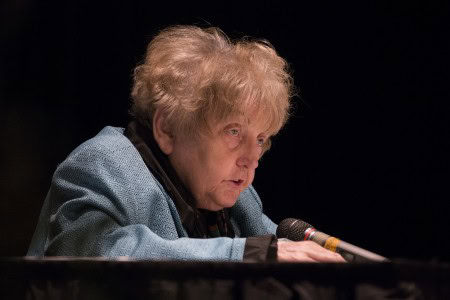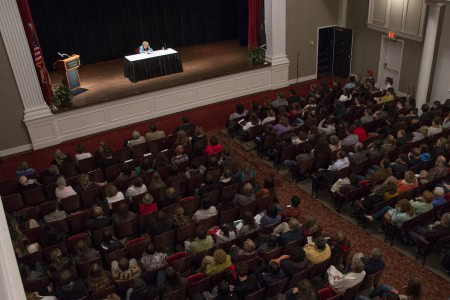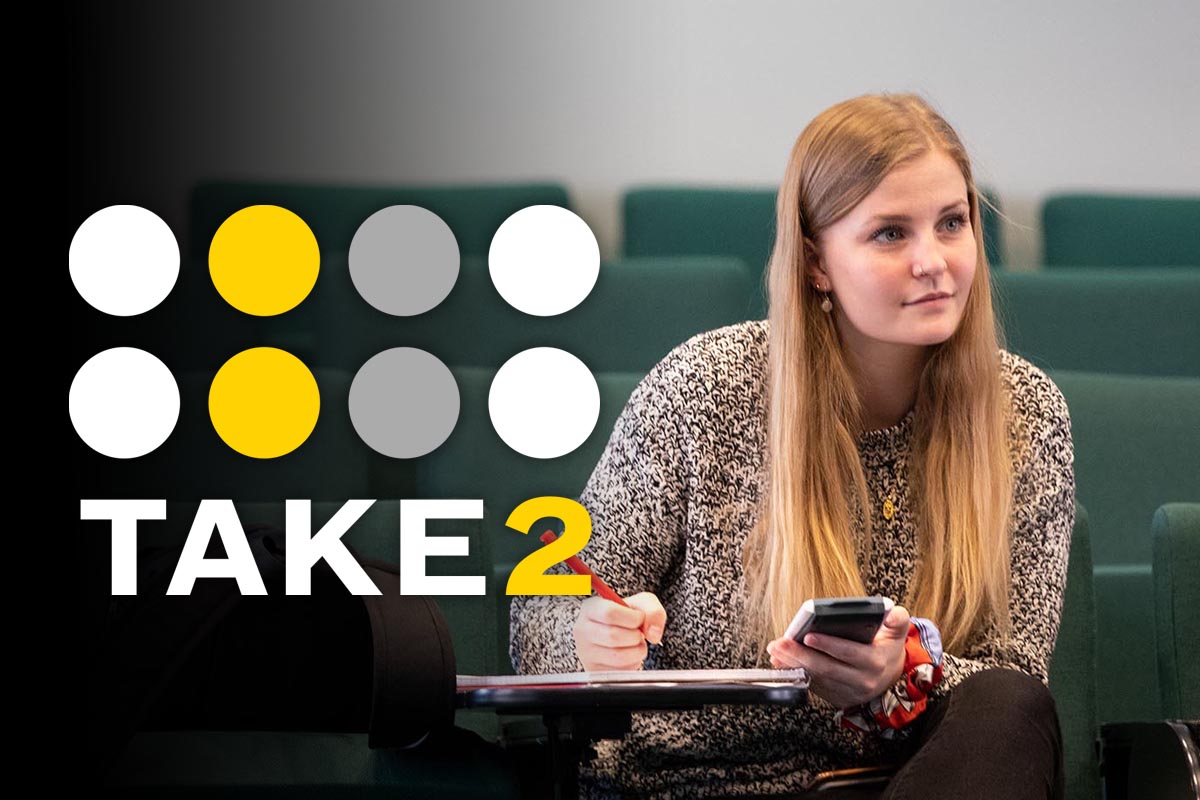Survivor of Holocaust twin experiments shares message of forgiveness at Randolph
 Holocaust survivor Eva Mozes Kor has seen the darkest side of human nature. At Randolph on Tuesday, however, she shed some light on the power of forgiveness in even the most extreme circumstances.
Holocaust survivor Eva Mozes Kor has seen the darkest side of human nature. At Randolph on Tuesday, however, she shed some light on the power of forgiveness in even the most extreme circumstances.
A native of Romania, Kor and her family were sentenced by the Nazis to the Auschwitz concentration camp in 1944. The 10-year-old Kor and her twin sister, Miriam, were separated from their family and selected for experimentation by the infamous Dr. Josef Mengele.
The two sisters were subjected to degrading daily tests and restrained while doctors injected harmful, unknown drugs and diseases into their right arms. When they weren’t in the labs, Kor recalled living in a repurposed horse stable. On her first night in the crowded, rat-infested building, she ventured to a nearby restroom where she found three dead children.
“I had never seen anybody dead before, but it was clear to me that in this place, people were dying—children were dying,” she said. “At that moment, I made a silent pledge that I would do anything and everything within my power to make sure that Miriam and I would not end up on that filthy latrine floor and that somehow, we would survive and walk out of this camp alive.”
Kor later made a second pledge to stay alive when she became ill and developed a high fever after one of the injections. She knew that if she died, the Nazis would also kill her sister so that they could compare autopsy reports on the twins. It took two weeks for Kor’s fever to break and to be reunited with her sister, and her only memory from that time was fading in and out of consciousness as she crawled across the hospital floor toward a water faucet.
After nearly a year at Auschwitz, the twins were finally freed in January 1945 by Soviet forces. The sisters then spent nine months in refugee camps before returning to Romania. In 1960, Eva Kor married another Holocaust survivor, Michael Kor, and moved with him to the United States. Determined to find other survivors of the Mengele experiments, Eva and her sister founded Children of Auschwitz Nazi Deadly Lab Experiments Survivors (CANDLES) in 1984. The organization has helped connect 122 individual twins living across 10 countries and four continents.
On Tuesday, Kor said that although her life has been filled with tragedy, she is at peace because she decided to forgive Dr. Mengele and the Nazis. In 1995, she even returned to Auschwitz to make that forgiveness public. With her was Dr. Hans Münch, a Nazi doctor who knew Dr. Mengele, but did not work with him in Auschwitz. Kor found herself in the predicament of wanting to thank Münch for confessing to his crimes, which included his operation of shower-style gas chambers.
 Following the advice of a former teacher and friend, Kor wrote a letter to Münch as if she was addressing Mengele himself. “I said, ‘You are a monster and you’re not even a human being. You’re a mass murderer who murdered my family, but in spite of all that, I forgive you,’” she said. “I discovered that even though I had been a victim for over 50 years, I had power over Josef Mengele and my relationship with him would not be defined by what he did. It would be defined by my forgiveness, and there was nothing he could do to change it.”
Following the advice of a former teacher and friend, Kor wrote a letter to Münch as if she was addressing Mengele himself. “I said, ‘You are a monster and you’re not even a human being. You’re a mass murderer who murdered my family, but in spite of all that, I forgive you,’” she said. “I discovered that even though I had been a victim for over 50 years, I had power over Josef Mengele and my relationship with him would not be defined by what he did. It would be defined by my forgiveness, and there was nothing he could do to change it.”
In addition to telling her story, Kor shared life lessons with the Randolph community. She first told the audience never to give up on themselves or their dreams. “There is always hope after despair, and there is always a tomorrow after disaster,” she said. “If we don’t give up on ourselves and our dreams, we can accomplish anything we set our minds to.”
Kor also spoke about the danger of prejudice, and reminded the audience that it is still a danger to society today. She jokingly admitted that she struggles with her own prejudice against American fashion. “Prejudice is the cancer of the human soul,” she said. “It destroys people who use it and it destroys societies who permit it.”
An avid Twitter user, Kor’s most recent passion has been using social media to try and help Syrian refugees. “I know how it feels to have a home and how it feels not to have one,” she said. “When you go home tonight, I hope you enjoy it a little bit extra.”
Following the lecture, Kor signed copies of her books and met with students. Alexis Collins ’17, who has a fraternal twin, said Kor’s relationship with her twin sister resonated with her the most.
“The Mengele twin experiments have always been one of the freakiest parts of the Holocaust to me,” she said. “I was really interested in her relationship with her twin sister because even though we’re fraternal twins, my sister and I can kind of tell what the other is thinking and doing.”
Kor is one of several Holocaust survivors who have shared their perspectives with the Randolph community in recent years. In 2014, Margit Meissner told the story of how she escaped Paris on a bicycle as Nazi forces approached the city—only to be arrested after crossing the Spanish border. Also in 2011, Gerda Wiessman Klein, recipient of the 2011 Presidential Medal of Freedom, urged Randolph students to advocate for tolerance and service and to do their part to combat hunger.
See local media coverage of Eva Kor’s Randolph lecture at:
http://wset.com/news/local/holocaust-survivor-discusses-love-of-humanity-refugees
Tags: Eva Kor, events, history, holocaust, holocaust survivors, lectures, speakers
